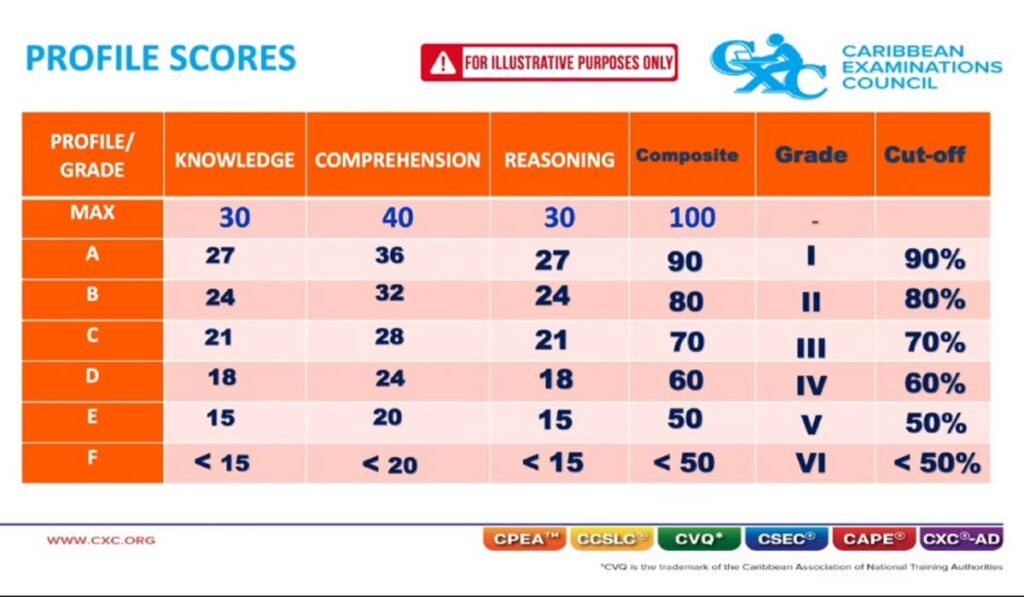CXC students can apply for early results; Mathematics grading explained

Students who need early access to their Caribbean Secondary School Examination results have until August 17 to apply for them through Caribbean Examinations Council’s (CXC) website or the university/college they are applying to.
This was announced by members of the council during a media conference to explain the modified marking scheme for CSEC Mathematics, as Paper II would not be used as part of the grading scheme for the subject following a leak on the day of the exam.
CXC examinations director Nicole Manning said the early result release request deadline is August 17. She said CXC was aware of concerns regarding access to their grades for application to tertiary institutions.
“Candidates who may need their results earlier can apply online for the early submission of their grades as well as, they need to go through the university, so they need to ask the university to make the request of CXC. We have partnerships with various universities, and they can ask CXC for the results of the particular candidate.”
She said the reason results would not be released until August 24 is to accommodate the submission ad marking of the school-based assessments (SBA).
Exam development and production senior manager Alton McPherson explained the modified marking method. He said CXC marks using three profiles: knowledge, comprehension, and reasoning. He said the maximum score a candidate can earn is 200 points under the original system.
Normally, Papers Papers 1, 2, and 3 contribute 30 per cent, 50 per cent, and 20 per cent respectively to the candidate’s final grade. He said since Paper 2 had been removed, Paper 1 will contribute 60 per cent and Paper 3 or its alternative would contribute 40 per cent. Candidates can now earn a maximum of 100 marks.
“For the purpose of grading, the paper contribution is not as important as the profile contribution, since CXC grades on profiles and not paper. The knowledge profile contributes 30 per cent, comprehension 40 per cent, and reasoning 30 per cent. Each paper has a profile and each question is tagged to a profile.”
McPherson said each profile has a letter grade A-F, and CSEC had a six-point grading system I-VI.
“Each grade band in each grading system has a specific cut-off point. CXC does not make cut-offs public. Let us assume that the minimum score a candidate may earn to be awarded a Grade III, the lowest acceptable grade, is 70 marks out of the available 100 marks.” (See attached table).
He said this means to achieve a Grade I, students would have to achieve 90 per cent or above, with anything less than 50 per cent being a Grade VI. He said each profile’s letter grade is associated with a range of scores, which contributes to the final grade awarded.
“For knowledge and reasoning, an A grade ranges from 27-30 marks, a B grade ranges from 24-26 marks, a C grade from 21-23 marks, D from 18-20 marks, E from 15-17 marks, and F from 14 marks and below. For comprehension, A ranges from 36-40, B ranges from 32-35, C from 28-31, D from 24-27, E from 20-23, and F from 19 marks and below.”
McPherson said, as usual, Profile Grades D, E, and F would not be allowed for a Grade I and Profile Grades E and F would not be allowed for Grade II and III.
He said the Paper 3 (II), which is the alternative to the SBA is designed to be equivalent to what is done for the SBA.
“While we understand they are done under different conditions, there are scaling techniques that are used to accommodate the bias in the scores between the two papers.”
Manning said the decision not to administer another Paper 2 in light of the breach was due to two reasons.
“We would have received solicitation from various territories, and it was seen and perceived that we would have been putting candidates through too much to do another paper. Secondly, given that the fact we had a scientifically proven methodology that can be utilised, we thought it would have been better to use the modified approach, since it was a tried and proven method, and we can provide fair and valid grades with this approach.”
Manning said in Jamaica and Trinidad, where papers were stolen and candidates flooded out respectively, they were given and took the options to write supplemental papers. With respect to the stolen papers in Jamaica, she said,
“This matter is under investigation by the police in the particular country and CXC will make the necessary decisions based on the output from that before results are released on August 24.”
Manning said the methodology used to arrive at the modified grading scheme, the video explaining the scheme, and student reports could be found on CXC’s website.

Comments
"CXC students can apply for early results; Mathematics grading explained"